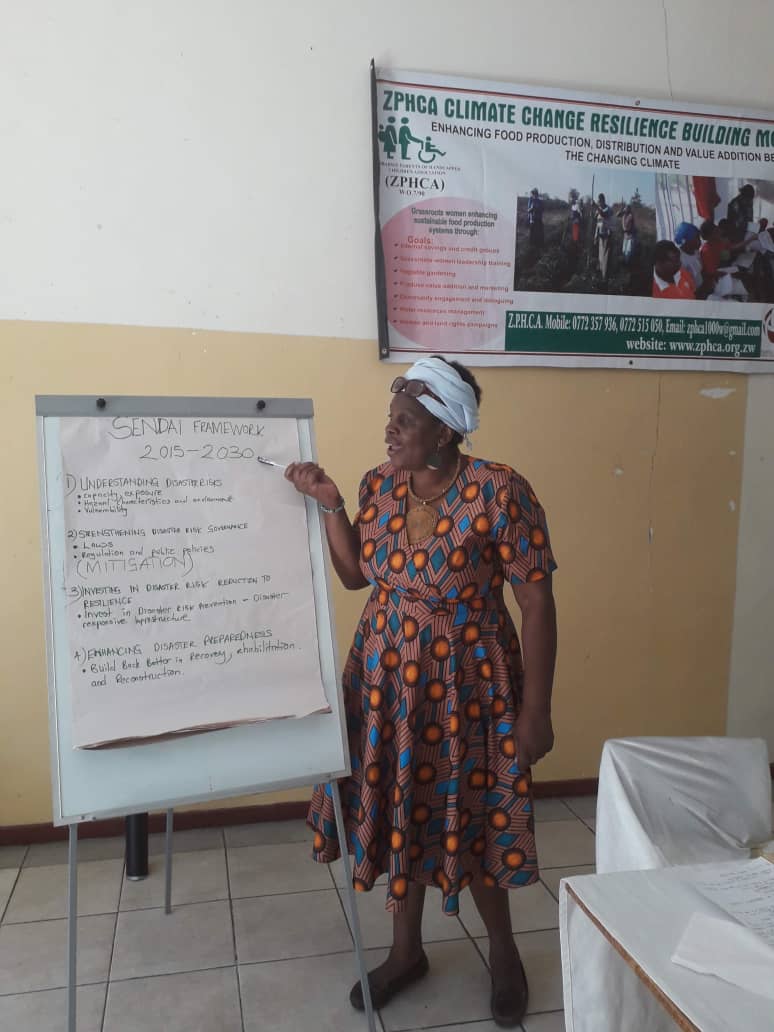The Zimbabwe Parents of Handicapped Children Association (ZPHCA) is building grass-root women and the community’s resilience to climate change, it has been established.
With support from Huairou Commission, ZPHCA is undertaking efforts to reduce potential impacts of this natural catastrophe by embarking on awareness campaigns, workshops as well as providing peer education and information reading materials to its members.
“In coping with climate change, we train the parents of children with disabilities skills in gardening, small grains farming, drought resistant crops, and small livestock like goats, sheep, rabbits and road runners. We also connect them to experts in early warning systems who work with meteorologists in updating communities about rainfall patterns for particular seasons,” said Theresa Makwara, ZPHCA Coordinator.
The women are taught about the importance of avoiding starting veld fires, avoiding living in stream banks, quickly moving to high places during flooding periods and the use of light materials.
At their meeting at the Adelaide Acres in Harare today, various women shared success stories realised through the resilience programme. Elizabeth Chidi (56) who is a leader of the grassroots women of the St. Mary’s resilience group in Chitungwiza said she learnt a lot in gardening through the Huairou Commission funded project.
“I am doing gardening where I grow different vegetables like tsunga, rape, beetroots and spinach. I used to sell the vegetables to help myself. Now, I have expanded the business to cater for the extended family and the community of Chitungwiza. I learnt a lot from peer education. I visited Ntengwe area and learnt how to make composit in empty beer bottles. I managed to train more grassroot women in our organisation. I thank Huairou Commission and ZPHCA for supporting me. I managed to buy myself 2 shovels, a wheelbarrow and 2 hoes from the vegetables project,” Chidi said.
Her colleague in the same group, Tambudzai Karichi (49) is making jam from a natural fruit called Masawu in Shona language. She is part of a six-member group and each sells at least 10 bottles per day to the local community. With additional funding of about US$500 last year, the group managed to diversify their product to include selling kapenta fish.
Lorraine Musonza (54) from the Dema Rural Group says they were given land for a garden by the traditional leader where they are also growing a variety of vegetables.
“In 2018, our group of 20 women farmers started a savings cooperative from the capital of US$500 provided by Huairou Commission and ZPHCA. I used to own a single bed of vegetables before the fund. Now I have more than 15 vegetable beds. As the group leader, I monitor my colleagues’ projects to ensure success. We are now selling our vegetables to big markets like the Mbare and Chikwanha vegetable markets,” Musonza said.
Charity Denya from Kushingirira Group in Highfield says her group is also into gardening but has diversified to sell peanut butter. They also run a savings cooperative and are into basket weaving and pottery. Through the project, most of the members who are widows, now afford to send their children to school and buy them clothes. Other members like Shelly Nhema, managed to build toilets at their homesteads as well as putting floors to their houses.






